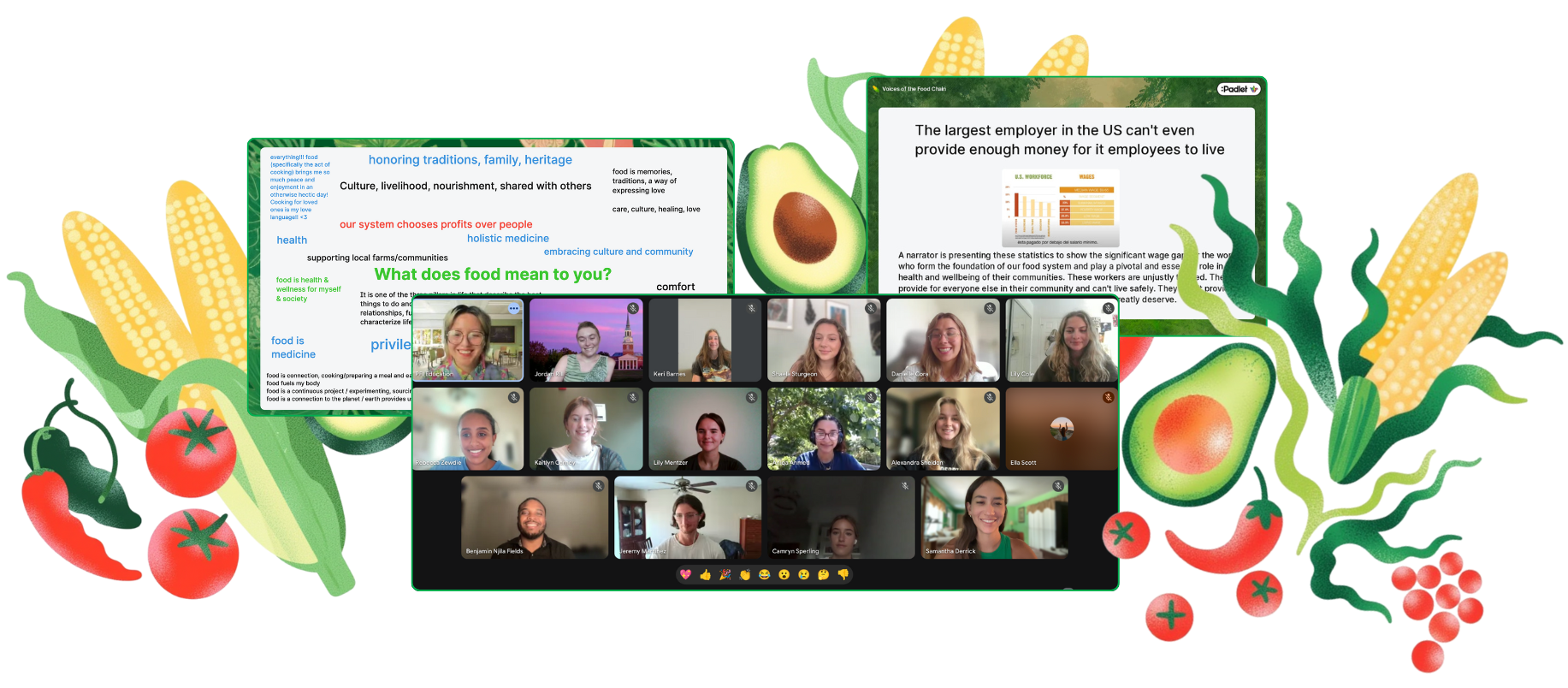Course Overview
Foundations of a Plant-Centered Future offers an accessible, interdisciplinary introduction to plant-centered food systems through a systems-thinking lens. Drawing from expertise in nutrition, public health, environmental science, and community leadership, the course invites students on a journey of connection between self, systems, and solutions.
Through interactive live sessions, reflective activities, and guest speakers, students build the voice, language, and confidence they’ll use as emerging changemakers. The course is an exercise in social entrepreneurship, self-discovery, and community organizing, laying the groundwork for lifelong, purpose-driven engagement in shaping a better food future.
By the end of the course, students will:
Understand how food intersects with multiple disciplines and scales of impact
Build confidence and community as ethical, systems-minded leaders
Articulate their personal “why”
for joining the plant-centered movement
Develop an Institutional Change Proposal rooted in local impact
Course Values
This course is guided by three core values that frame learning as both inner and systemic transformation:
Systems Entrepreneurship
Connecting personal, public, and planetary health with animal welfare, diversity, and equity.
Ethical
Leadership
Merging activism and entrepreneurship to benefit a broad and diverse range of stakeholders
Creative Transformation
Reimagining commerce, education, and community engagement as acts of cultural and ecological stewardship.
Across disciplines, from public health and environmental studies to business, policy, and the arts, few educational spaces center plants, food systems, and cultural wellbeing as interconnected levers for change. Traditional curricula often silo topics like nutrition, sustainability, and policy, leaving out the emotional, cultural, and intergenerational dimensions of how we eat and relate to the Earth. This fragmentation limits students’ ability to see themselves as part of systemic transformation.
Foundations of a Plant-Centered Future responds by offering a multidisciplinary and intergenerational learning environment that grounds food systems education in personal reflection, community wellbeing, and collective action.
-
“I used to see food mainly as just personal choice, but I now understand it as a powerful driver of climate resilience, equity, and community wellbeing.”
— Course Participant
-
“The course helped me connect my lived experience with systems thinking. I left with language, community, and a clearer path forward.”
— Student Reflection
-
Students and emerging professionals from any discipline who seek knowledge, tools, and practices for exploring plant-centered futures with care, creativity, and impact.
-
Each week focuses on a key dimension of plant-centered leadership and change:
Understanding plant-centered systems — from plant intelligence to regenerative design
From personal plates to systemic change — linking everyday choices with global systems
Navigating climate and food emotions — fostering resilience and collective wellbeing
Connecting to culture, land, and community — exploring food as identity and reciprocity
Indigenous frameworks and sovereignty — learning from ancestral systems of care
Opening to diverse futures — practicing imagination and futures thinking
Collective action for regeneration — turning insight into community proposals
Reflecting forward — articulating purpose and pathways for future impact
-
A systems-thinking lens connecting food, culture, labor, and climate
Practice-based tools for regenerative and equitable food systems
Frameworks grounded in Indigenous and community-led movements
A supportive network of peers, mentors, and practitioners
A final portfolio artifact (zine or project) and completion certificate
In 2026, we’ll launch a certificate accessible to young professionals and students worldwide.
Subscribe to our newsletter for the next announcement.


